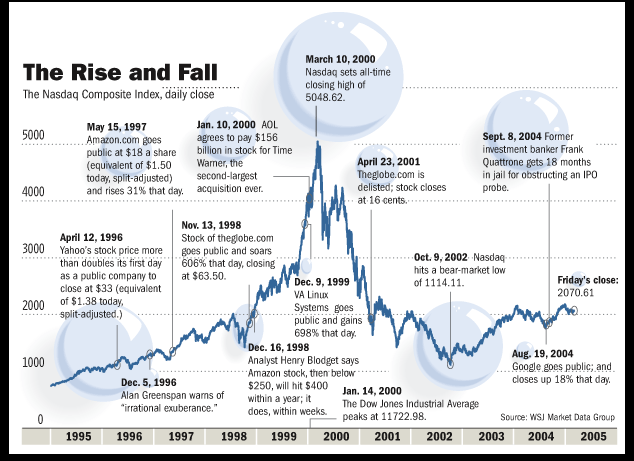The Dot-Com Bubble: A Blast From the Past, Lessons for the Future
The late 1990s were a period of dizzying optimism and unbridled speculation. The internet, a fledgling marvel, fueled dreams of boundless opportunity. Companies with ".com" in their names, regardless of profitability or even a clear business model, became instant darlings of the stock market. This was the era of the Dot-Com Bubble, a period of dramatic stock price inflation followed by a spectacular crash that left investors reeling and reshaped the technology landscape.
From Boom to Bust: A Timeline of the Dot-Com Bubble
Bubble 1995-1997: The Seeds of Mania: The initial public offering (IPO) of Netscape in 1995 marked the beginning of the frenzy. Soon, companies with even the faintest connection to the internet experienced meteoric rises in their stock prices. Investors, caught up in the euphoria, poured money into anything "dot-com," often ignoring traditional valuation metrics.
1995-1997: The Seeds of Mania: The initial public offering (IPO) of Netscape in 1995 marked the beginning of the frenzy. Soon, companies with even the faintest connection to the internet experienced meteoric rises in their stock prices. Investors, caught up in the euphoria, poured money into anything "dot-com," often ignoring traditional valuation metrics.
1998-2000: Peak Frenzy and the NASDAQ Soars: Fuelled by easy credit and media hype, the bubble ballooned. The NASDAQ Composite index, heavily weighted towards tech stocks, skyrocketed, climbing over 500% between 1995 and 2000. IPOs became instant successes, with investors eagerly snapping up shares regardless of a company's fundamentals.
2000-2002: The Burst and the Aftermath: The bubble could not sustain itself indefinitely. Concerns about valuations, coupled with rising interest rates and a slowing economy, triggered the sell-off. The NASDAQ crashed, losing over 75% of its value between 2000 and 2002. Many dot-com companies went bankrupt, wiping out billions of dollars in investor wealth.
Anatomy of a Bubble: Unpacking the Causes
Dotcom:max_bytes(150000):strip_icc()/dotcom-bubble.asp-FINAL-97b80a4f3ae44b38bef25defa02127a5.png) The Dot-Com Bubble wasn't a spontaneous phenomenon. Several factors contributed to its formation and eventual burst:
The Dot-Com Bubble wasn't a spontaneous phenomenon. Several factors contributed to its formation and eventual burst:
- Speculative Investor Sentiment: The belief that internet companies represented the future fueled unbridled optimism, leading investors to prioritize hype over fundamentals.
- Loose Monetary Policy: The Federal Reserve's low-interest-rate environment made borrowing cheap, further encouraging risk-taking in the market.
- Inadequate Regulation: Limited oversight allowed companies with shaky business models to attract significant investments.
- Media Hype: Uncritical media coverage fueled the frenzy, portraying dot-com companies as surefire winners, regardless of reality.
Lessons Learned: Echoes in the Crypto Age
The Dot-Com Bubble serves as a cautionary tale, offering valuable lessons for both investors and policymakers:
- Beware of Herd Mentality: Ignoring due diligence and following the crowd can lead to disastrous financial decisions.
- Value Fundamentals over Hype: Don't get swept away by empty promises and flashy narratives; focus on a company's underlying business model and financial health.
- Beware of Excessive Leverage: Borrowing heavily to invest in speculative assets can amplify losses when the bubble bursts.
- Regulation is Key: Balanced regulations can help prevent excessive speculation and protect investors from fraudulent activities.
The cryptocurrency market, with its rapid fluctuations and high volatility, bears some resemblance to the dot-com era. By understanding the lessons of the past, investors can navigate the present with greater caution and awareness, preventing history from repeating itself in the realm of digital assets.
The Dot-Com Bubble may be a relic of the past, but its echoes resonate in today's financial landscape. By remembering the factors that fueled the frenzy and the consequences of ignoring fundamentals, we can approach future investment opportunities with a keener eye, ensuring that innovation thrives alongside financial prudence.
tune
share
more_vert
expand_content
add_photo_alternate
mic
send
Gemini, kişiler de dahil olmak üzere farklı konular hakkında yanlış bilgiler gösterebilir. Bu nedenle, verdiği yanıtların doğru olup olmadığını kontrol edin. Gizliliğiniz ve Gemini Uygulamaları






































